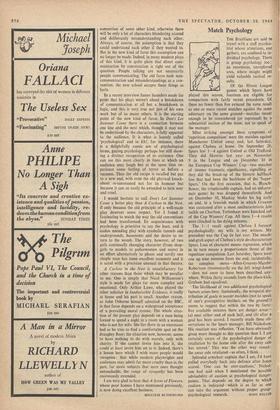Match Psychology
THE Brazilians are said to_
travel with a staff psychia- trist whose attentions, one
gathers, are confined to in-
dividual psychology. There is group psychology too: an enormous, unexplored area, where insight might yield valuable tactical re- sults.
Of the fifteen League games which Spurs have played this season, fourteen are eligible for comparison with fairly recent precedents. Of these no fewer than five evinced the same result as one or more recent matches against the same adversary on the same ground—matches recent enough to be remembered (or repressed) by a substantial section of the team, not to speak of the manager.
Mbst striking amongst these symptoms of 'repetition compulsion' were the matches against Manchester United away and, last Saturday, against Chelsea at home. On September 26, Spurs lost 1-4 against United at Old Trafford. They did likewise last year on November 9 in the League and on December 10 in the European Cup Winners' Cup—two matches of intense traumatic significance, signalling as they did the break-up of the historic halfback line that had been the backbone of the 'Super- Spurs.' On the first occasion, that is, Blanch- flower, the irreplaceable captain, had an unfortu- nate game; he was dropped thenceforth. And on December 10, Mackay broke his leg early on and, in a feverish match in which Greaves was cautioned after a most uncharacteristic late tackle on Charlton, Tottenham were knocked out of the Cup Winners' Cup. All these 1-4 results were clinched in the dying minutes.
The 1-1 result against Chelsea I foresaw psychologically; my wife is my witness. My
precedent was the Cup tie last year. The smash- and-grab aspect of Chelsea's style de-characterises Spurs. Loss of character means regression, which
in its turn means a proportionate threat of the repetition compulsion. Last Saturday, Spurs were one up nine minutes from the end; incidentally, the complete move—Allen-G reaves-Marchi- Robertson (momentarily on the left wing)-Jones —does not seem to have been described any- where. Within thirty seconds from the place-kick, Graham had equalised. The likelihood of two additional psychological factors arises here. Statistically, the temporal dis- tribution of goals in soccer matches (not to speak of one's precognitive instincts on the ground!) seems to suggest that within the two by forty-
five available minutes there are danger areas— (a) near either end of each half, and (b) after a goal has been scored. I recently made these ob-
servations to the Spurs manager, Bill Nicholson.
His reaction was reflective. `You have obviously given more thought to this question than I. I am
certainly aware of the psychological danger of retaliation by the home side after the away side has scored.' This was the other way round : the away side retaliated—as often, I think. Splendid armchair captain that I am, I'd have pulled everybody back into defence after Jones scored. 'One can be over-cautious,' Nichol- son had said when I mentioned the possible advisability of caution at psychological danger-
points. That depends on the degree to which caution is indicated—which is as far as one can take the argument without proper group-


































 Previous page
Previous page